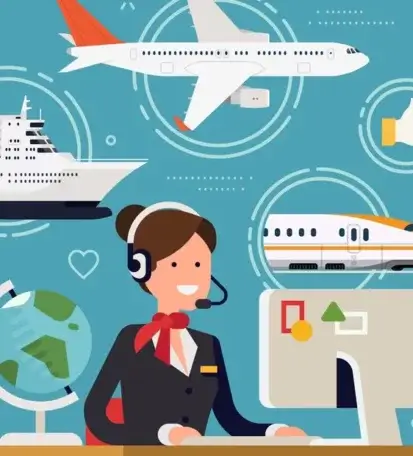Business Travel Guide
9 Benefits of Organizing Company Trips for Employees

Organizing company trips for employees is a great way to foster a positive work environment and boost team morale. Taking a break from the daily routine and spending time together outside of the office can help employees build stronger relationships, which can lead to increased collaboration and productivity in the workplace.
In addition to improving team dynamics, company trips can also provide employees with valuable learning opportunities. For example, attending conferences or workshops can help employees stay up-to-date with the latest industry trends and best practices.
This can benefit both the employee and the company as a whole, as new knowledge and skills can be applied to improve business operations.
1. Fostering Collaboration
Organizing company trips for employees is an excellent way to foster collaboration among team members. When employees travel together, they get to know each other better, build trust, and develop stronger relationships.
This leads to better communication, increased productivity, and improved teamwork. During company trips, employees have the opportunity to engage in team-building activities, brainstorming sessions, and knowledge sharing.
As a result, employees are more likely to work together effectively and achieve common goals.
In addition, you should learn how to organise company trips and provide a platform for employees to learn from each other and share best practices. This can be particularly valuable when employees come from different departments or locations.
2. Improving Communication
Aside from fostering collaboration, organizing company trips can have a significant impact on improving communication among employees. When employees are taken out of their usual work environment, they tend to be more relaxed and open to communication.
This can lead to better relationships among employees and improved collaboration. During company trips, employees have the opportunity to interact with colleagues from different departments and levels of the organization.
As a result, they become more engaged and motivated to work towards achieving the company’s goals.
One way to improve communication during company trips is by organizing team-building activities. These activities can help employees develop trust and respect for each other, which can lead to better communication and collaboration.
For example, team-building activities such as scavenger hunts, obstacle courses, and escape rooms can help employees work together towards a common goal while having fun.
3. Enhanced Team Building
Organizing company trips for employees can significantly enhance team building. By taking employees out of their usual work environment, they have the opportunity to interact with each other in a more relaxed setting.
This allows them to get to know each other on a personal level, which can lead to better communication and collaboration in the workplace.
During company trips, employees can participate in team-building activities that promote trust, communication, and problem-solving skills. These activities can be tailored to the specific needs of the team and can include anything from outdoor adventures to group exercises.
In addition to team-building activities, company trips can also provide opportunities for employees to socialize with each other outside of work. This can help to build stronger relationships and foster a sense of community within the team.
4. Reducing Burnout
Employee burnout is a common issue that impacts both the individual and the company as a whole. Burnout can lead to decreased productivity, higher absenteeism rates, and even turnover.
However, organizing company trips can help reduce burnout among employees. Travelling to new places and experiencing different cultures can be a refreshing change of pace for employees who may feel stuck in their daily routines.
This change of scenery can help reduce stress and increase job satisfaction. According to a study by Mental Health America, chronic workplace stress costs the U.S. economy $500 billion every year in lost productivity. By encouraging employees to take time off and travel, companies can help reduce this stress and improve overall productivity.
Companies can implement thoughtful policies to further reduce burnout and promote a culture that values work-life balance.
For example, setting a cap on the frequency of business trips can help limit stress from travel. Providing paid time off and encouraging employees to use it can also help reduce burnout and improve overall job satisfaction.
5. Recognition and Reward
One way to recognize employees is by offering travel incentives for meeting or exceeding company goals. This can be in the form of a company-wide benefit or specific teams that work on complex projects.
According to MTI Events, incentive travel can help improve retention among top employees, reduce employee turnover, and boost team morale. Another way to recognize employees is by offering personalized travel rewards.
This can be in the form of a trip tailored to the employee’s interests and preferences. Also, according to Xceleration, personalized travel rewards can help reduce stress, increase creativity, and boost confidence among employees. This not only benefits individual team members but also the company as a whole.
Overall, recognition and reward are important aspects of employee motivation and engagement. By offering well-planned and enjoyable company trips, companies can show their employees that they are valued and appreciated. This can lead to increased employee motivation, engagement, and loyalty.
6. Boosted Employee Morale
Organizing company trips for employees can have a significant impact on employee morale. It is a great way to show employees that their hard work is valued and appreciated.
According to a study by the Incentive Research Foundation, 94% of employees who went on a company trip felt motivated to perform better at work.
One way company trips can boost employee morale is by providing a break from the daily routine. Employees can relax and recharge, which can lead to increased productivity when they return to work.
Additionally, company trips can create a sense of camaraderie among employees. When employees spend time together outside of work, they can build stronger relationships and work better as a team.
Overall, organising company trips for employees can have a positive impact on employee morale. It can provide a break from the daily routine, create a sense of camaraderie, and provide a sense of recognition.
7. Increased Productivity
When organizing company trips for employees, can have a significant impact on their productivity. When employees are given the opportunity to take a break from their daily routine, they return to work feeling refreshed and rejuvenated.
This can lead to increased motivation and a more positive attitude towards work. In addition, company trips can provide employees with the opportunity to learn new skills and gain new experiences.
For example, a team-building activity such as a ropes course can help employees develop their communication and problem-solving skills, which can be applied to their work.
By providing employees with the opportunity to take a break from their daily routine, learn new skills, and build stronger relationships, companies can create a more positive and productive work environment.
8. Employee Retention
According to a study by NetSuite, effective employee retention strategies and processes benefit organizations in numerous ways.
One of the key benefits of employee retention is the reduction of turnover costs. When employees leave, companies incur costs associated with recruiting, hiring, and training new employees.
In addition to reducing turnover costs, employee retention also improves company performance across a number of key metrics.
For instance, employee retention leads to increased productivity, as experienced employees are more productive than new hires. Furthermore, employee retention leads to increased customer satisfaction, as experienced employees are better equipped to handle customer inquiries and complaints.
Organizing company trips is an effective way to improve employee retention by boosting employee morale and job satisfaction. When employees feel valued and appreciated, they are more likely to remain with the company.
9. Long-Term Company Growth
By investing in employee travel, companies can foster a sense of community and teamwork among employees, which can lead to increased productivity and innovation.
One way that company trips can contribute to long-term growth is by providing employees with opportunities to network and build relationships with colleagues from other departments or locations.
This can help break down silos and encourage collaboration, which can lead to new ideas and projects that might not have been possible otherwise.
Overall, investing in company trips can be a smart long-term strategy for companies looking to foster a positive and productive work environment, build strong relationships among employees, and drive innovation and growth.
Frequently Asked Questions
How can company trips enhance team building and employee morale?
Company trips provide an opportunity for employees to bond and develop stronger relationships with each other. By engaging in team-building activities, employees can learn to work together more effectively and develop a sense of camaraderie. This can lead to improved morale and job satisfaction.
What are the potential productivity gains from organizing company outings?
Organizing company outings can have a positive impact on productivity. By taking a break from their usual routine and engaging in a fun activity, employees can return to work feeling refreshed and re-energized. This can lead to increased productivity and better job performance.
In what ways do company trips contribute to staff retention and job satisfaction?
Company trips can contribute to staff retention by demonstrating that the company values its employees and is invested in their well-being. By providing opportunities for employees to have fun and socialize outside of work, the company can create a more positive work environment and increase job satisfaction. This can lead to increased employee loyalty and reduced turnover.




